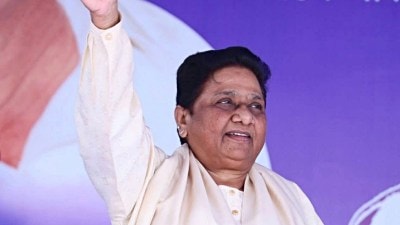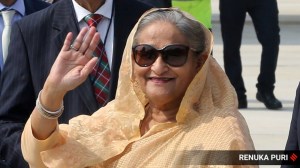Proposed ST and OBC reservations for new groups in J&K: How the BJP could benefit electorally
A Bill introduced in Parliament has triggered protests by the ST Gujjar-Bakerwal who fear a dilution of their tribal rights and empowerment. The proposed legislation contain provisions that can potentially alter the socio-political complexion of the Union Territory and help the BJP in elections.
 BJP workers dance as they celebrate the Union government's Bill granting reservation to over 12 lakh Pahari people in Jammu and Kashmir, at BJP office in Jammu, on July 28. (Photo: PTI)
BJP workers dance as they celebrate the Union government's Bill granting reservation to over 12 lakh Pahari people in Jammu and Kashmir, at BJP office in Jammu, on July 28. (Photo: PTI) The Centre has brought four Bills related to Jammu and Kashmir in Parliament. The Bills are seen as a prelude to holding Assembly elections, and they contain provisions that can potentially alter the socio-political complexion of the Union Territory.
This is especially true of The Constitution (Jammu and Kashmir) Scheduled Tribes Order (Amendment) Bill, 2023, and The Jammu and Kashmir Reservation (Amendment) Bill, 2023. All four Bills were introduced in Lok Sabha on July 26.
Scheduled Tribes in India
Article 366(25) of the Constitution defines Scheduled Tribes as “such tribes or tribal communities or parts of or groups within such tribes or tribal communities as are deemed under Article 342”.
Article 342(1) empowers the President to specify an ST in a state or UT, after consultation with the Governor. Article 342(2) says “Parliament may by law include in or exclude from the list of Scheduled Tribes specified in a notification issued under clause (1) any tribe or tribal community or part of or group within any tribe or tribal community…”.
The ST list is not a nationwide list — it is state/ UT-specific.
The Constitution does not specify the criteria to determine ST status. However, characteristics such as “primitive traits, geographical isolation, distinct culture, backwardness and shy of contact” have been well established.
The recommendation of the concerned state/ UT government with full justification, and the concurrence of the Registrar General of India (RGI) and the National Commission for Scheduled Tribes (NCST) are essential to designate a community as ST.
The country’s first order related to STs was The Constitution (Scheduled Tribes) Order 1950, which was issued by President Rajendra Prasad on September 6, 1950. It contained statewise lists of tribes, and was followed by 16 similar orders until 2016.
There are no notified Scheduled Tribes in Haryana, Punjab, Chandigarh, Delhi, and Puducherry.
Scheduled Tribes in J&K
The first ST-related order for J&K was issued on October 7, 1989, and amended on September 17, 1991.
The Bill in Parliament, brought by the Ministry of Tribal Affairs, proposes to amend The Constitution (Jammu and Kashmir) Scheduled Tribes Order, 1989, to include four new entries — “Gadda Brahmin”, “Koli”, “Paddari Tribe” and “Pahari Ethnic Group” in the list of Scheduled Tribes in J&K.
Following a recommendation from the J&K administration on including these four communities in the ST list, the Centre consulted the Registrar General of India (RGI) and the National Commission for Scheduled Tribes. With the addition of the four new communities, J&K will have a total 16 ST communities.
The Paharis of J&K
The Paharis are primarily a linguistic group. They form 8.16% of J&K’s population, and are concentrated in the Poonch and Rajouri districts in the Pir Panjal region of Jammu. According to the J&K government’s ‘Population Survey of Pahari Speaking People’ released on February 1, 2018, Paharis form 56.03% of the population of Poonch district, 56.10% of Rajouri, 11.84% of Kupwara, 14% of Baramulla, 7.86% of Anantnag, 5.88% of Ganderbal, and 5.04% of Shopian district.
“Paharis rationalise their background and tribal identity by asserting similarities with the Gujjars on the basis of geographical, social, political and economic situation,” the report says. The inclusion of the Pahari community in the proposed expanded ST list has been vehemently opposed by the Gujjar-Bakerwal, who make up around 10% of J&K’s population, and are the largest ST community in the UT. The Gujjar-Bakerwal see the inclusion of Paharis as being aimed at diluting their tribal rights.
Nine seats in the 90-member J&K Assembly are reserved for STs. Soon after scrapping J&K’s special status and downgrading the erstwhile state to two UTs, the government gave 4% reservation to Pahari-speaking people in January 2020.
Although several state governments since the 1980s have recommended ST status for Paharis, the Centre has had a reason to reject the recommendation. Paharis were always considered a linguistic group — “Pahari Speaking People” — and were thus unable to fulfill the requisite criteria to be considered as ST. That is why the Bill refers to the “Pahari Ethnic Group”, and not “Pahari Speaking People”.
Possible electoral gains for BJP
The BJP’s political goal is to expand its electoral successes beyond the Hindu-majority districts of Jammu, and cobble up a majority to form the first elected government that will be formed after the constitutional changes of August 5, 2019.
If it is successful in that exercise, the party hopes to be able to get the J&K Assembly’s stamp of approval on the Centre’s decision to scrap the special status of the erstwhile state.
The Paharis include Muslims, Hindus, and Sikhs, and make up the majority in 10 Assembly constituencies, eight of which are in Pir Panjal. The Paharis also have a substantial presence in the Karnah and Uri seats of Kashmir.
The BJP has been unable to establish an electoral foothold in the Muslim-majority areas of J&K. Grant of ST status to the Paharis can help it gain support in these areas. Also, once the Bill becomes law, Pahari candidates can contest seats reserved for STs, challenging the Gujjar-Bakerwal monopoly over these seats.
While the BJP does not intend to directly antagonise the Gujjar-Bakerwal, it does see electoral benefits in a Pahari-Gujjar divide. By gaining the support of the Paharis, the BJP also hopes to draw electoral dividend in two seats in Kashmir.
Following delimitation, Nowhsera and Sunderbani-Kalakote in Pir Panjal are now Hindu-majority seats, while Rajouri is divided evenly between the two main communities. In these seats, the BJP’s traditional vote bank, along with the Pahari Muslims, can create a potentially winning combination.
The inclusion of the Paddaris in the ST list too could help the BJP because a new constituency of Padder-Nagseni was carved out during the recent delimitation process. This seat, in Kishtwar district, is inhabited by Paddaris, and has a Hindu majority.
Gujjar and Pahari points of view
Anwar Choudhary, who heads the Gujjar-Bakerwal Joint Action Committee, said: “The BJP has calculated, and is confident that once Paharis get ST status, they will join with the BJP’s traditional vote base and help the party win across the Rajouri-Poonch belt.’’
Choudhary said that unlike the Paharis, the Gujjar-Bakerwal are entirely Muslim. “This is why the BJP wants to dilute our ST protections and benefits,” he said.
Choudhary argued that “Unlike Paharis, we are still backward and underdeveloped. We are truly tribal, while the Paharis are primarily a linguistic group.’’ Choudhary said the BJP would like the Gujjars to agitate and fight with the Paharis, so that the Paharis move en masse towards the party. “But we will not do that,” he said. “We will protest peacefully. We will have peaceful marches, like our Kupwara to Kuthua march last year. We will approach the courts to defend our tribal rights.”
Shahbaz Khan, who heads the J&K Pahari Peoples Movement, however, insisted that the “Paharis are an ethnic group, exactly like Gujjars.”
“We are a tribe too,” Khan said. “Gujjars have portrayed themselves as nationalists and convinced earlier central governments that we don’t deserve to be included among STs. We were unfairly treated only because 70% of Paharis of this region live in PoK and are a majority there,’’ Khan said.
He added: “On the ground, there is hardly any difference between the Gujjars and us. Our way of life, our living conditions are similar. The only difference is language. When Gujjars were included in ST in 1991, we were unfairly dropped”.
Khan said the Paharis were grateful to BJP. “Our people consider this a very big favour from BJP. We had a big meeting of Pahari leaders from every party in Rajouri. It was attended by the BJP’s J&K president Ravinder Raina and general secretary Vibodh Gupta because they are also Paharis. Paharis made a promise to the BJP that once we get ST status, we will all vote together for you, at least once,’’ he said. “The BJP did this (included Paharis in the prospective expanded ST list) despite vehement opposition from Gujjars”.
The BJP’s defence
Ravinder Raina said the Paharis are very similar to the Gujjar-Bakerwal. “They are the same people. They have similar culture, same eating habits, face similar geographical difficulties, do seasonal migration, rear cattle and have dhoks in higher reaches. Paharis were dropped in 1991 (from the ST list) due to some conspiracy,’’ Raina said.
According to Raina, “When Prime Minister Narendra Modi came to Jammu to lay the foundation stone for the new AIIMS, leaders of the Pahari community told him about this injustice, and subsequently their file was reopened.”
The government then set up the Justice G D Sharma Commission to identify educationally, socially and economically backward communities. “That commission recommended ST status to the ethnic Pahari community,’’ Raina said.
He added: “Nearly 85% of the population of PoK is also Pahari. When Wing Commander Abhinandan’s plane fell in the Khoi Ratta area of PoK opposite Nowshera, it was the Paharis in PoK who were the first to come to his rescue by offering him water and treating his wounds until the Pakistani army reached there.’’
According to Raina, “there is no question of anybody being unhappy over reservation to Paharis”. “Home Minister Amit Shah publicly announced that reservation to Paharis will be over and above the 10% reservation available to the Gujjar-Bakerwal and other ST communities,’’ he said.
Introduction of OBCs
The second important Bill introduced in Lok Sabha, The Jammu and Kashmir Reservation (Amendment) Bill, 2023, will change the nomenclature of “weak and underprivileged classes (social castes)” to “other backward classes”. This means the addition of 15 more communities/ castes, including Chang, Jat, Saini, Perna/ Kouro(Kaurav), Acharyas, Gorkhas and West Pakistani refugees, to the list. These new beneficiaries are also among the BJP’s support base in Jammu.
The government has created a new reservation set-up in J&K that is likely to benefit the BJP electorally.
It has cut the 20% quota for residents of backward areas (RBA) by half, given 10% reservation to “economically weaker sections”, 2% to “weaker and underprivileged classes”, and added residents of areas adjoining the International Border in Jammu to the category limited for people living along Line of Control and raised their reservation to 3%.
There is also an 8% quota for SCs, 10% for STs, 3% to physically challenged, and horizontal reservation of 6% to ex-servicemen in J&K.
Gujjar leader Choudhary said the BJP has brought its entire support based under reservation. “Almost everybody living in posh Jammu colonies has reservation now,’’ he said.
BJP’s Raina said that the introduction of the “OBC category was important in J&K because there are 36 socially, educationally and economically backward sub castes, who were denied reservation earlier”. He claimed that “every fourth Muslim in Kashmir will now get the benefit of OBC reservation.”
Raina says that the PM and Home Minister have made it clear that there are no political considerations behind these decisions. “It is ‘sabka saath, sabka vikas, sabka vishwas‘,” he said.



- 01
- 02
- 03
- 04
- 05



































